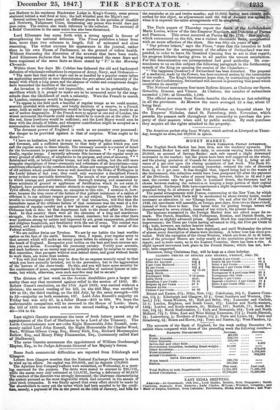Lord Ellesmere has come forth with a strong appeal in
favour of strengthening the national defences. The Times publishes a letter from him, more than two columns in length, full of animated and close reasoning. The writer excuses his appearance in the journal, rather than in his own House of Parliament, on the ground of infirm health. Without discussing the discretion of the avowals that have been made, Lord Ellesmere declares that he has long entertained the same fears and been cognizant of the same facts as those stated by " P." in the Morning Chronicle.
Within these few days Mr. Cobden has fathered the old and hackneyed delusion of wholesale reductions in expense of Army, Navy, and Ordnance-
" The mere fact that such a topic can be so handled by a popular orator before an applauding assembly at once demonstrates the prevalence and intensity of the torpor with which a long peace and the absence of visible and conspicuous danger have benumbed the faculties of the nation."
An invasion is evidently not impossible; and as to its probability, the sacrifices which it is proper to make are to be measured more by the mag- nitude than the likelihood of such a calamity. Were the French to march to London, resistance would be hopeless-
" To oppose in the field such a handful of regular troops as we could muster, scarcely provided with artillery, and totally destitute of a reserve, to a French army, such as under my supposition would be brought against them, would be an lid of useless desperation. If the French were to appear at one end of London, the wisest movement the Guards could make would be to march out at the other. For the rest, three howitzers would be sufficient; and the Lord Mayor would soon be busy with the details of billets, and whatever contribution might be accepted as a commutation for indiscriminate plunder."
The dormant power of England is such as no country ever possessed: the danger to be provided against is that of surprise. What ought to be done?—
" I have no hesitation, bold as it may seem, in answering that question. First and foremost, add a sufficient increase to that body of police which you now call the regular army in these islands. The necessary amount is a matter of detail for the Government to propose and the country to discuss. * • • I say empha- tically, regular troops. I earnestly advocate this increase of the regular army on e very ground of efficiency, of adaptation to its purpose, and even of economy. • • * Intermixed with, or behind regular troops, not only the militia, but the still more irregular descriptions of force—yeomanry and volunteers of all descriptions—may contribute effectually to the common defence. Alone and unsupported by that leaven of old soldiers whose qualities were so well described by the Duke of Wellington in the Lords' debate of last year, they could only encounter a disciplined French Army to their own inevitable destruction. The annals of war present no instance in which courage and patriotism, without thorough training and unassisted by those accidents of ground or appliances of fortification which do not exist in England, havepresented any serious obstacle to regular troops. The case of the Tyrol affords, for obvious reasons, no exception to this rale. I mention it, how- ever, because the true cause of the failure of that gallant resistance of a nation of riflemen is in one solitary respect germane to my subject. Those who take the trouble to investigate closely the history of that transaction, will find that the immediate cause of the ultimate failure of that resistance was the want of a few squadrons of regular cavalry and a few batteries of regular artillery. Let the Ordnance look to this: let that department look to the recent affair in Switzer- land. In that country there were all the elements of a long and murderous struggle. On the one hand there were, indeed, numbers; but on the other there were positions strong by nature and improved by art, great exasperation, political and religions fanaticism, and familiarity with the use of arms. The contest was decided, and decided quickly, by the superior force and weight of metal of the Federal artillery. " We are neither Swiss nor Tyrolese. We are by our habits the least warlike nation on the face of the earth. Increase, then, I repeat, your regular army to that amount which will make an enemy pause before he attempts to set foot on the beach of England. Reorganize your militia on the best and least onerous sys- tem you can devise. Encourage the yeomanry cavalry. Fortify your arsenals, and such harbours as an enemy may most probably attempt by surprise to occupy. Ent remember, that parapets without men behind them, and guns without halide to work them, are worse than useless. "You will find that all this may be done for an expense scarcely equal to that which you have annually lavished, not in the prevention, but in the aggravation of the horrors of the slave-trade. Do this, and you will have some security for the continuance of peace, unpurchased by the sacnfice of national honour or inte- tests, but which,, otherwise, even such sacrifice may fail to secure."























 Previous page
Previous page